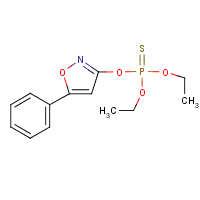Isoxathion
Agent Name
Isoxathion
CAS Number
18854-01-8
Formula
C13-H16-N-O4-P-S
Major Category
Pesticides

Synonyms
E-48; Isoxathion [BSI:JMAF:ISO]; Karphos; O,O-Diethyl O-(3-(5-phenyl)-1,2-isoxazolyl)phosphorothionate; O,O-Diethyl O-(5-phenyl-3-isoxazolyl) phosphorothioate; SI-6711; Phosphorothioic acid, O,O-diethyl O-(5-phenyl-3-isoxazolyl) ester; [ChemIDplus] UN3018
Category
Organophosphate Insecticides
Description
Yellowish liquid; [HSDB]
Sources/Uses
Used as contact and stomach insecticide for fruits, tea, tobacco, ornamentals, rice, sugarcane, vegetables, turf, and trees; [HSDB]
Comments
“The average of two baseline respective cholinesterase activity determinations three days apart, with no exposures to enzyme inhibiting pesticides for at least 30 days, is recommended for each worker prior to exposure to cholinesterase inhibitors because of large inter-individual differences in published baseline values. To be established at least once a year. Removal from workplace exposures is recommended until the cholinesterase activity returns to within 20% of baseline.” [TLVs and BEIs]
Restricted
No longer registered as a pesticide for use in the US; [HSDB] Banned in the EU for use as pesticide for plant protection; [eChemPortal: ESIS]
Biomedical References
Exposure Assessment
BEI
Acetylcholinesterase activity in red blood cells = 70% of individual's baseline; Butylcholinesterase activity in serum or plasma = 60% of individual's baseline; Sample at end of shift; [TLVs and BEIs]
Vapor Pressure
2.22E-06 mm Hg
Lethal Concentration
LC50 (rat) = 4,200 mg/m3/4h
Explanatory Notes
The Guide in the Emergency Response Guidebook is for "Organophosphorus pesticide, liquid, toxic."
Adverse Effects
Other Poison
Organophosphate
Diseases, Processes, and Activities Linked to This Agent
Diseases
Occupational diseases associated with exposure to this agent:
Processes
Industrial Processes with risk of exposure: